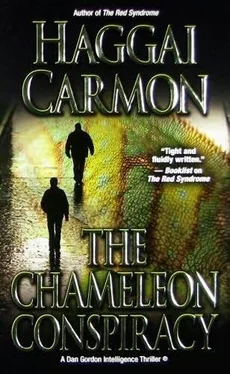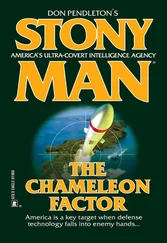Haggai Harmon - The Chameleon Conspiracy
Здесь есть возможность читать онлайн «Haggai Harmon - The Chameleon Conspiracy» весь текст электронной книги совершенно бесплатно (целиком полную версию без сокращений). В некоторых случаях можно слушать аудио, скачать через торрент в формате fb2 и присутствует краткое содержание. Жанр: Триллер, на английском языке. Описание произведения, (предисловие) а так же отзывы посетителей доступны на портале библиотеки ЛибКат.
- Название:The Chameleon Conspiracy
- Автор:
- Жанр:
- Год:неизвестен
- ISBN:нет данных
- Рейтинг книги:5 / 5. Голосов: 1
-
Избранное:Добавить в избранное
- Отзывы:
-
Ваша оценка:
- 100
- 1
- 2
- 3
- 4
- 5
The Chameleon Conspiracy: краткое содержание, описание и аннотация
Предлагаем к чтению аннотацию, описание, краткое содержание или предисловие (зависит от того, что написал сам автор книги «The Chameleon Conspiracy»). Если вы не нашли необходимую информацию о книге — напишите в комментариях, мы постараемся отыскать её.
The Chameleon Conspiracy — читать онлайн бесплатно полную книгу (весь текст) целиком
Ниже представлен текст книги, разбитый по страницам. Система сохранения места последней прочитанной страницы, позволяет с удобством читать онлайн бесплатно книгу «The Chameleon Conspiracy», без необходимости каждый раз заново искать на чём Вы остановились. Поставьте закладку, и сможете в любой момент перейти на страницу, на которой закончили чтение.
Интервал:
Закладка:
The result was obvious. The victims lost all their money when “Harold,” now believed to be Ward, defaulted on the loans and disappeared.
The FBI believed that Ward then moved to Indiana, called himself Marshall Stuart Lennox, and incorporated Windsor, Hamilton amp; Pierce Investments, Inc. He rented a nice office and offered unsophisticated investors historical bonds, such as railway bonds. These were once-valid obligations of American corporations, but are now worthless as securities and only collected and traded as memorabilia. Ward marketed the bonds at prices ranging from $100,000 to $250,000-the same bonds that collectors buy for $25 to $100. Ward, or rather Marshall Stuart Lennox, described the bonds as “backed by the U.S. government” and “payable in gold.” To add credibility to the genuine bonds’ inflated prices, Ward attached valuations by “world-renowned experts,” confirming that the bonds were worth significant amounts of money, far above the price the investors were asked to pay.
One investor became suspicious, contacted the Federal Reserve, and was told that the U.S. government was not backing these bonds. When confronted, Ward smoothly replied, “The Federal Reserve simply doesn’t want you to cash it in, because if everyone did that, there’d be a run on the bank and the U.S. economy would collapse.” But within the hour, Marshall Stuart Lennox had disappeared.
Similar sting operations in various forms followed in other unsuspecting small towns in the Midwest. Complaints to both state and federal authorities mounted, but the investigations led to indictments that went nowhere, because the defendant was nowhere to be found.
For more than a decade, Ward was an enigma. Nobody knew where he was, or could even accurately describe how he looked. He had shunned the ordinary business-publicity photos, and the descriptions his victims gave fit a million other men. All the FBI had concerning Ward’s description was a high school photo more than twenty years old, and his fingerprints taken in 1979, when Ward had been arrested for assault. Ward’s legacy ended abruptly in summer 2001. That was the last time there were complaints about scams fitting Ward’s modus operandi. Had Ward died? No death certificate bearing his name or any of his aliases was issued anywhere in the U.S.
Had Ward left the U.S.? If so, how? His U.S. passport, issued in 1980, had expired in 1990. The State Department reported that this passport hadn’t been renewed. Had a new passport been issued bearing any of the aliases the FBI said he used for his scams? The State Department said no. Was Ward in prison on an unrelated conviction? Again, the FBI said no.
The mantra think outside the box rang in my mind. They were the words of Alex, my Mossad Academy training instructor, repeated in his Canadian accent. “Your rivals aren’t ordinary people. They operate differently, so why would you expect them to think like an average Joe? Put yourself in their skin. Then take one step forward.” Good, I thought, as long as we aren’t on a cliff’s edge.
What did I do to deserve these damned stale cases? Suddenly angry, I tossed a heap of paper off my desk. It was useless-plenty more was still piling up on my desk. Why the hell was the FBI dumping these cases on us two years after the last scam and almost two decades since the first one, and where was the international connection? I silently cursed the anonymous FBI agent who had cleared his desk at my expense. I wished he’d drown in paper. I couldn’t decide who to grumble to first-David or the FBI.
When I cooled off, I remembered what Alex had always told our class: “When you find yourself at a dead end, start from the beginning. One step back may not be enough, because it will lead you to the same brick wall. Revisit all assumptions, and recheck all facts. One or more could be flawed.”
OK, Alex, I thought with a mental sigh, if you could only see how I apply your wisdom. I wondered what had happened to him. Ever since I’d left the Mossad, Benny Friedman, my classmate, had been the only lifeline to my professional past. For all I knew, Alex was still in the system, or maybe growing flowers in his village in northern Israel, enjoying retirement. I read the files again. Two hours later, I still couldn’t find anything I’d missed the first time. The only mention of anything foreign was Ward’s departure from the U.S. in 1980. But he returned sometime in 1985, as the credit reports showed. There went the international connection. I had no idea where to begin.
Think outside the box rang again.
The only thing left for me to do was go back and check the raw intelligence data the FBI was analyzing.
I was frustrated and intrigued at the same time. How could somebody evade the law for so long? It was clear that Ward knew well how to assume new names and identities. Was thinking that he had employed that skill to vanish, thinking within the box or outside it? I needed something to hang on to in this case, or the file would grow moss on my shelves, and I’d be getting polite but per sis tent reminders from David to report progress.
I called David Stone in Washington, DC, grimly bracing myself.
“David, how come you agreed to take Ward’s cases? They’re so stale that even the bookworms who lived in the reports died of old age.”
“Dan, the FBI is fairly confident that Ward is outside the United States,” he said. “That makes the case ours, at least as it concerns the $311 million he stole.”
I was startled for a moment. “$311 million? The amounts in the file don’t even come close to that.”
“Do the math again,” said David. “Eleven known cases-he fared nicely.”
“OK, I’ll look again at the numbers. But what makes them think he’s outside the U.S.? There’s nothing in the file to indicate that. Or the FBI is holding an ace up their sleeve.”
“The Bureau won’t tell us. So I guess it’s intelligence, not facts or evidence, and you know how zealously they protect their sources.”
“What do you mean they won’t tell us? Last time I checked we work for the same government.”
“No need to be sarcastic,” said David, trying to calm down my mounting temper, which he knew only too well. David himself could have a bit of a temper too, but he kept a much tighter lid on his than I did mine. “To the extent that any of it is grand-jury material, they can’t share it with other sections of the government working on the civil side of the case.”
That’s bull, I thought. “Well, David, as an attorney for the government I can receive certain grand-jury material for use in performing my duty. Besides, this case appears to involve bank fraud, so there’s an additional specific language allowing the disclosure. Let’s chew the fat here.”
I could almost hear David’s silent and subtle smile over the phone.
“You’re right,” he finally agreed.
“And?” I asked hoping to get support here. “Why is U.S. law enforcement extra-interested nowadays in high-dollar cases, even if stale? Have they just remembered it has an international aspect, and the post-September eleventh public outcry made them resurrect paper cadavers?”
“Go figure,” he said, joining in my despair.
I kept on pressing, “Unless someone at the FBI simply wanted to get rid of these cases to better his or her statistics, hoping we won’t cry foul, they’d better tell us what they have, or they’ll find these cases back on their desk in no time, dead and aging bookworms included.”
“Dan,” said David in his calm voice. “Think about how the Bureau handled the S-and-L cases in the eighties.” I remembered it well. Neither the Bureau nor federal prosecutors went after the money looted in bank and savings-and-loan frauds. We went only after perpetrators. The statistics we tracked were numbers indicted and numbers convicted. The government wasn’t going after the money.
Читать дальшеИнтервал:
Закладка:
Похожие книги на «The Chameleon Conspiracy»
Представляем Вашему вниманию похожие книги на «The Chameleon Conspiracy» списком для выбора. Мы отобрали схожую по названию и смыслу литературу в надежде предоставить читателям больше вариантов отыскать новые, интересные, ещё непрочитанные произведения.
Обсуждение, отзывы о книге «The Chameleon Conspiracy» и просто собственные мнения читателей. Оставьте ваши комментарии, напишите, что Вы думаете о произведении, его смысле или главных героях. Укажите что конкретно понравилось, а что нет, и почему Вы так считаете.












